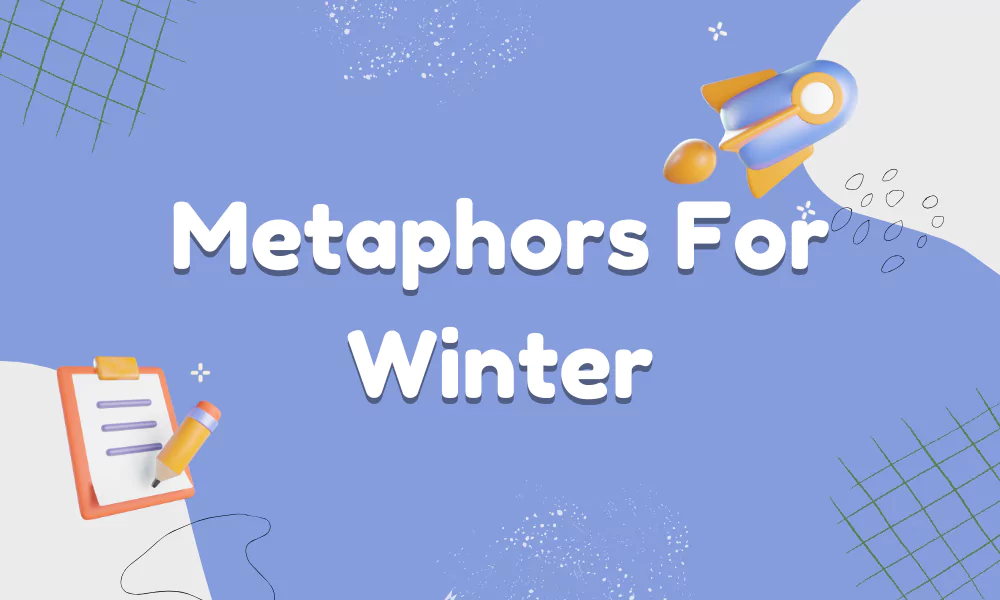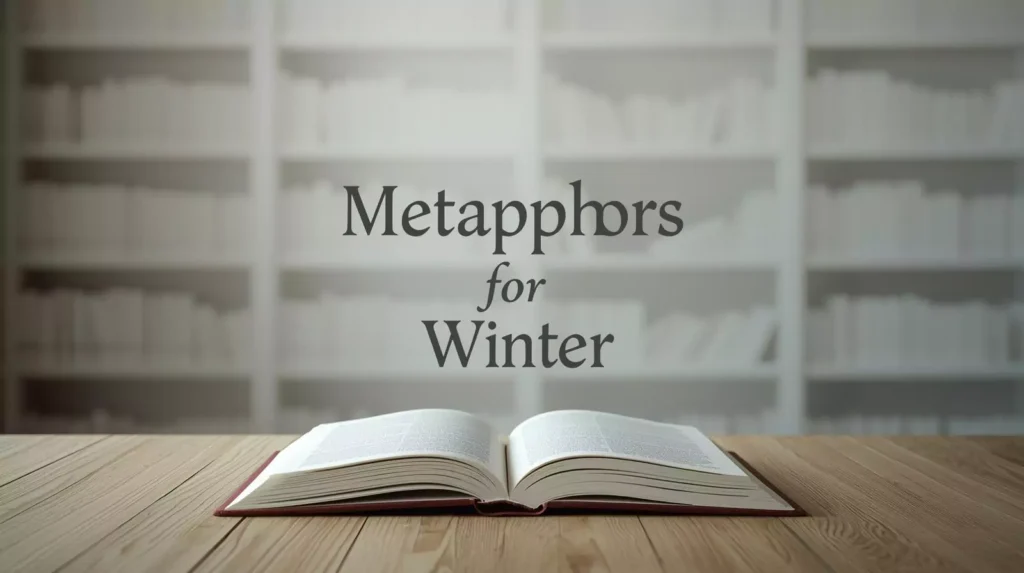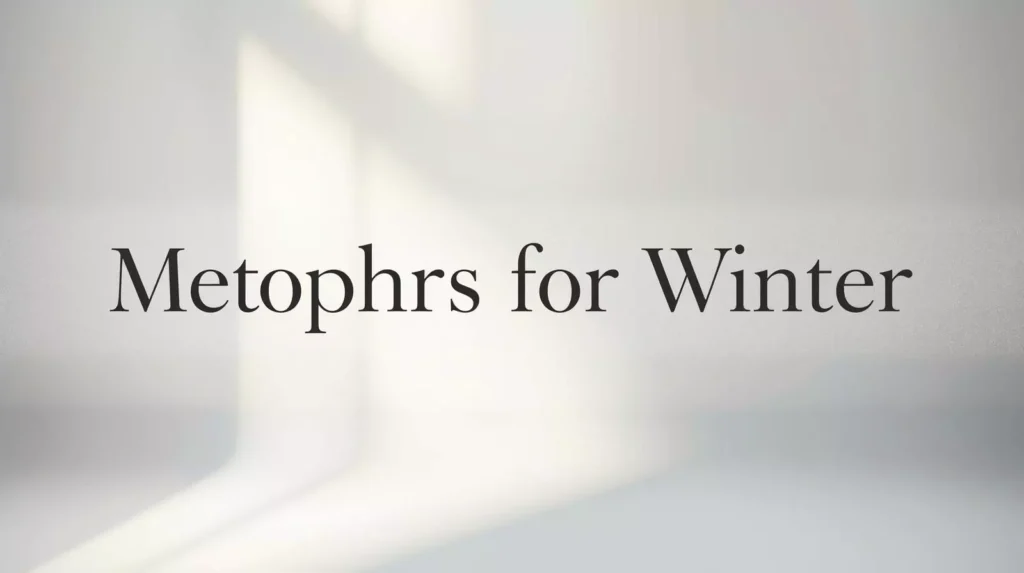Metaphors for Winter – Symbolic Meanings of Cold and Stillness

Winter is more than just a season of frosty mornings and snow-covered streets, it’s a canvas for imagination and meaning. Through metaphors, writers and poets transform the cold and stillness into vivid images of reflection, renewal, and quiet beauty. A snowfall becomes a soft blanket of silence, icy winds a whisper of change, and frozen landscapes a reminder of resilience. These comparisons invite us to see winter not merely as something to endure, but as a poetic pause in the cycle of life.
What are Metaphors for Winter?
Metaphors for winter are imaginative comparisons that describe the season by linking it to something beyond weather. Instead of saying “it’s cold,” a metaphor might call winter “a frozen canvas,” “a silent pause,” or “a locked garden.” These figurative expressions capture the emotions, moods, and meanings we associate with winter. By using metaphors, writers and speakers bring winter to life in a more vivid and poetic way, helping us see the season not only as a time of frost and snow, but as a symbol of transformation and quiet renewal.

Everyday Metaphors for Winter
- Winter is a Blanket – Suggests warmth and covering.
Example: Winter is a blanket that tucks the world into rest. - Winter is a Pause Button – Represents a time of slowing down.
Example: Life feels like winter’s pause button has been pressed. - Winter is a White Canvas – Symbolizes a fresh start.
Example: The snowy streets became winter’s white canvas. - Winter is a Silent Room – Conveys quietness and stillness.
Example: The frozen morning felt like winter’s silent room. - Winter is a Heavy Coat – Stresses the weight of the season.
Example: Winter wrapped the city in its heavy coat. - Winter is a Locked Door – Suggests restrictions or waiting.
Example: Winter is a locked door that only spring can open. - Winter is a Sleeping Garden – Represents dormancy.
Example: The backyard was winter’s sleeping garden. - Winter is a Closed Book – Reflects endings and waiting for new chapters.
Example: Each year, winter is a closed book waiting for spring to write again. - Winter is an Empty Stage – Suggests stillness and preparation.
Example: The fields lay bare, an empty stage of winter. - Winter is a Frozen Mirror – Symbolizes reflection.
Example: The lake was winter’s frozen mirror of the sky. - Winter is a Quiet Teacher – Represents lessons in patience.
Example: Winter is a quiet teacher of endurance. - Winter is a Tired Traveler – Suggests slowness and exhaustion.
Example: The sun moved like winter’s tired traveler. - Winter is a Heavy Curtain – Suggests darkness and cover.
Example: The night fell like winter’s heavy curtain. - Winter is a Cold Embrace – Both harsh and intimate.
Example: Winter greeted us with a cold embrace. - Winter is a Sleeping Child – Suggests peace and rest.
Example: The fields lay still, like winter’s sleeping child. - Winter is a Glass Cage – Beautiful but confining.
Example: The frost made the window winter’s glass cage. - Winter is a Resting Heartbeat – Represents stillness.
Example: The frozen river pulsed like winter’s resting heartbeat. - Winter is a Stone Wall – Suggests barriers.
Example: Winter stood firm like a stone wall around us. - Winter is a Shadow – Represents gloom.
Example: The city fell under winter’s long shadow. - Winter is an Old Photograph – Suggests faded beauty.
Example: The snowy park was winter’s old photograph of stillness. - Winter is a Cold Whisper – Quiet but sharp.
Example: The wind carried winter’s cold whisper. - Winter is a Broken Clock – Time feels frozen.
Example: The days stretched like winter’s broken clock. - Winter is a Locked Chest – Holds hidden treasures.
Example: The ground was winter’s locked chest of seeds. - Winter is a Glass of Ice Water – Refreshing yet numbing.
Example: Winter poured itself like a glass of ice water. - Winter is a White Veil – Suggests mystery and cover.
Example: Snow became winter’s white veil over the earth. - Winter is a Silent Bell – Stillness with potential sound.
Example: The empty streets rang with winter’s silent bell. - Winter is a Patient Friend – Waits for renewal.
Example: Winter is a patient friend who sits quietly by. - Winter is a Heavy Book – Dense and slow to read.
Example: The months dragged on like winter’s heavy book. - Winter is a Quiet Symphony – Suggests subtle harmony.
Example: Snowfall was winter’s quiet symphony. - Winter is a Cold Cage – Restrictive and icy.
Example: We felt trapped in winter’s cold cage. - Winter is a Silver Crown – Suggests dignity.
Example: The mountains wore winter’s silver crown. - Winter is a Waiting Room – Suggests anticipation.
Example: The season felt like winter’s waiting room for spring. - Winter is a Slow Dance – Suggests grace in slowness.
Example: The falling snow was winter’s slow dance. - Winter is a Fading Song – Suggests melancholy.
Example: The evening echoed with winter’s fading song. - Winter is a Crystal Prison – Beauty with confinement.
Example: The trees were locked in winter’s crystal prison. - Winter is a Quiet Mask – Hides the world beneath.
Example: Snow was winter’s quiet mask over the land. - Winter is a Heavy Quilt – Suggests covering warmth.
Example: Winter laid its heavy quilt over the earth. - Winter is a Lonely Path – Suggests solitude.
Example: The frozen road stretched like winter’s lonely path. - Winter is a Silver Cage – Both beautiful and confining.
Example: The frosty branches formed winter’s silver cage. - Winter is a Pause in Music – Suggests silence in rhythm.
Example: Life felt like winter’s pause in the music of seasons.
Cultural & Literary Metaphors for Winter
- Winter is Death’s Cloak – Classical symbol of endings.
Example: The forest wore winter’s deathly cloak. - Winter is Time’s Silence – From poetry, symbolizing reflection.
Example: Winter was time’s silence before renewal. - Winter is the Great Equalizer – Culturally, it affects all alike.
Example: Winter became the great equalizer, sparing none. - Winter is the Old Sage – Literature often casts winter as wisdom.
Example: Winter spoke like the old sage of the seasons. - Winter is the White Shroud – A poetic metaphor for endings.
Example: Snow covered the town like winter’s white shroud. - Winter is the Poet’s Pause – Linked to creativity.
Example: The frost was winter’s poet’s pause in time. - Winter is the Grim Guest – Literary personification of hardship.
Example: The village braced for winter, the grim guest. - Winter is the Storyteller’s Quill – Symbolizing inspiration.
Example: Snowflakes fell like winter’s storyteller’s quill writing the land. - Winter is the Eternal Watcher – Represents vigilance in folklore.
Example: The mountains stood as winter’s eternal watcher. - Winter is Nature’s Lullaby – Literary symbol of rest.
Example: The falling snow was winter’s lullaby for the earth. - Winter is the White Silence – From poetry.
Example: Winter descended with its white silence. - Winter is the Stoic Monk – Represents discipline.
Example: The season felt like winter’s stoic monk teaching patience. - Winter is the Harsh Judge – A symbol of trials.
Example: Crops faced winter, the harsh judge of survival. - Winter is the Dreaming Season – Folklore links it to dreams.
Example: Winter was the dreaming season for weary souls. - Winter is the Frozen Stage – Used in theater/literature.
Example: The lake turned into winter’s frozen stage for nature’s play. - Winter is the Final Act – Symbolizes closure.
Example: The year ended with winter’s final act. - Winter is the Ancient Guardian – Literature depicts it as a protector.
Example: Winter stood as the ancient guardian of the land. - Winter is the White Tomb – Symbolizes endings and silence.
Example: The valley became winter’s white tomb of stillness. - Winter is the Silent King – Poetic authority of the season.
Example: The cold ruled like winter’s silent king. - Winter is the Forgotten Chapter – Symbol of neglect in literature.
Example: The garden felt like winter’s forgotten chapter.
Creative & Modern Metaphors for Winter
- Winter is a Wi-Fi Blackout – Disconnection.
Example: The long nights felt like winter’s Wi-Fi blackout. - Winter is Nature’s Screensaver – Frozen stillness.
Example: Snow turned the town into winter’s screensaver. - Winter is Life on Airplane Mode – Slowness, pause.
Example: We lived in winter’s airplane mode of life. - Winter is the Frozen App – Technology metaphor.
Example: The frozen road was winter’s stalled app. - Winter is the Cold Filter – Instagram-style lens.
Example: Everything looked muted under winter’s cold filter. - Winter is a System Reboot – Renewal process.
Example: Nature entered winter’s system reboot. - Winter is Low Battery Mode – Energy-saving phase.
Example: Our routines slipped into winter’s low battery mode. - Winter is Nature’s Power Nap – Modern twist on dormancy.
Example: The forest sank into winter’s power nap. - Winter is the Cold Algorithm – Predictable but rigid.
Example: The season followed winter’s cold algorithm. - Winter is Frozen Data – Stillness with potential.
Example: The lake became winter’s frozen data, waiting to flow again. - Winter is the Silent Notification – A quiet signal.
Example: The chill was winter’s silent notification of change. - Winter is the Loading Screen – Waiting for spring.
Example: The world sat at winter’s loading screen. - Winter is a Frozen Browser Tab – Life feels stuck.
Example: The week dragged on like winter’s frozen tab. - Winter is Nature’s Reset Button – Fresh start.
Example: Winter pressed nature’s reset button for spring. - Winter is a White Noise Machine – Background calm.
Example: Snowfall was winter’s white noise machine for the soul. - Winter is the Cold Emoji – A symbolic shorthand.
Example: The icy winds became winter’s cold emoji in real life. - Winter is Air-Conditioning Gone Wild – Harsh cold.
Example: The blizzard was winter’s AC gone wild. - Winter is the Frozen Playlist – Stuck vibes.
Example: Life paused on winter’s frozen playlist of days. - Winter is Cloud Storage – Everything is “held” away.
Example: Seeds waited in winter’s cloud storage of soil. - Winter is the Sleep Mode of Earth – Rest before awakening.
Example: The land powered down into winter’s sleep mode.

Synonyms of Winter With Meanings
| Synonyms | Meanings |
|---|---|
| The Cold Season | The time of year characterized by cold weather. |
| The Frosty Season | A period when frost and freezing temperatures dominate. |
| The Snowy Season | The part of the year when snow is most common. |
| The Chill Season | A time marked by sharp, chilly weather. |
| The Dark Season | The season when sunlight is scarce and darkness lingers. |
| The Dormant Season | A time when plants and animals go into dormancy or hibernation. |
| The White Season | A period marked by snow blanketing everything in white. |
| The Bleak Season | A season often seen as lifeless or difficult to endure. |
| The Frozen Season | A season when rivers, lakes, and landscapes freeze. |
| The Hibernal Season | A term derived from “hibernate,” used in poetry and literature to denote winter. |
How to Use Winter Metaphors in Writing & Speaking
- Use it as a Metaphor for Challenge – Show how working together helps people endure the “cold” phases of life.
- Frame it as Renewal Through Unity – Tip: Connect teamwork during winter with growth and renewal after hardships.
- Apply it in Motivational Speaking – Use it to inspire resilience and persistence.
- Weave it into Storytelling – Make it part of a narrative arc—conflict (winter) → unity (teamwork) → resolution (spring).
- Use it for Creative Writing – Employ it symbolically in poetry, fiction, or essays to show solidarity during hardship.
Read: Metaphors for Teamwork
FAQs
Conclusion
Winter is far more than a season of frosty winds and snowy nights, it’s a canvas of meaning, painted with vivid metaphors that help us see its deeper beauty. From everyday comparisons like “a blanket” or “a locked garden” to cultural, literary, and even modern metaphors, winter comes alive as a symbol of stillness, resilience, and transformation. These figurative expressions remind us that beneath the cold lies reflection, renewal, and the quiet promise of spring. By using winter metaphors in writing and speaking, we not only capture the season’s atmosphere but also enrich our language with imagery that resonates with emotion and creativity.
